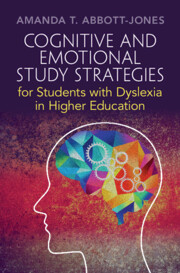Book contents
- Cognitive and Emotional Study Strategies for Students with Dyslexia in Higher Education
- Cognitive and Emotional Study Strategies for Students with Dyslexia in Higher Education
- Copyright page
- Dedication
- Contents
- Figures
- Preface
- Acknowledgements
- Preview of the Contents of the Book
- 1 Introductory Chapter: Dyslexia and Difficulties with Study Skills
- 2 Organisation Techniques and Meeting Deadlines
- 3 Note-Taking Strategies
- 4 Reading Strategies
- 5 Making Learning Memorable
- 6 Essay-Writing Strategies
- 7 Spelling Techniques
- 8 Revision and Examination Techniques
- 9 Presentation Techniques
- 10 Public Speaking, Interviews, Seminar Discussion and Debate Techniques
- 11 Emotional Coping Techniques and Looking After Your Wellbeing
- Epilogue
- References
- Index
1 - Introductory Chapter: Dyslexia and Difficulties with Study Skills
Published online by Cambridge University Press: 14 September 2023
- Cognitive and Emotional Study Strategies for Students with Dyslexia in Higher Education
- Cognitive and Emotional Study Strategies for Students with Dyslexia in Higher Education
- Copyright page
- Dedication
- Contents
- Figures
- Preface
- Acknowledgements
- Preview of the Contents of the Book
- 1 Introductory Chapter: Dyslexia and Difficulties with Study Skills
- 2 Organisation Techniques and Meeting Deadlines
- 3 Note-Taking Strategies
- 4 Reading Strategies
- 5 Making Learning Memorable
- 6 Essay-Writing Strategies
- 7 Spelling Techniques
- 8 Revision and Examination Techniques
- 9 Presentation Techniques
- 10 Public Speaking, Interviews, Seminar Discussion and Debate Techniques
- 11 Emotional Coping Techniques and Looking After Your Wellbeing
- Epilogue
- References
- Index
Summary
The purpose of the Introductory Chapter is to set the scene on the nature of dyslexia. Firstly, dyslexia is defined in the chapter as a multiple deficit disorder characterised by difficulties with phonological processing, rapid naming, working memory, processing speed and the automatic development of skills that may not match up to an individual’s cognitive abilities. These difficulties present differently in each dyslexic individual. Secondly, the specifying of the characteristics of dyslexia leads to outlining the types of cognitive difficulties that students with dyslexia face when undertaking various academic tasks. Reading, writing, spelling, exams, presentations, organisation, seminar discussion and note taking all present barriers for dyslexic learners. These difficulties are explained in relation to each study skill and reasons for these problems specified. Consequently, the reader will gain an understanding of how dyslexia deficits such as problems with phonology, information processing, working memory, retention and retrieval impact negatively upon the ability to competently undertake study tasks. The ways in which this affects dyslexic learners emotionally is also presented and it is explained how negative emotion such as anxiety can also impede on academic performance, perhaps to a greater extent than the cognitive difficulties associated with dyslexia.
Keywords
- Type
- Chapter
- Information
- Cognitive and Emotional Study Strategies for Students with Dyslexia in Higher Education , pp. 1 - 35Publisher: Cambridge University PressPrint publication year: 2023



